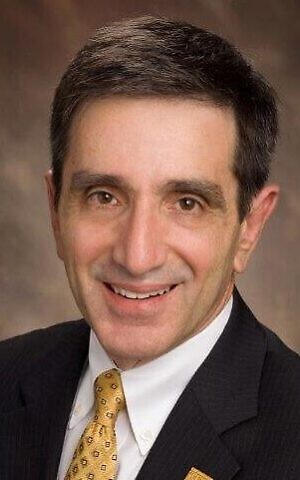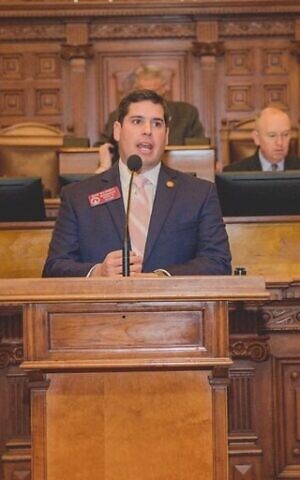Jewish Interests Under the Gold Dome
Federation and other communal groups will monitor the state legislature during the next 12 weeks.
Dave Schechter is a veteran journalist whose career includes writing and producing reports from Israel and elsewhere in the Middle East.

Jewish Atlanta will be watching how the Georgia General Assembly handles numerous issues — including funding care of the elderly and disabled, countering anti-Semitism and the future of Buckhead — during the session that began Jan. 10 and is scheduled to adjourn March 31.
The Jewish Federation of Greater Atlanta employs Rusty Paul — the president of iSquared Communications, Inc., as well as the mayor of Sandy Springs — to lobby legislators on behalf of the community.
Topping a list of JFGA’s priorities is an increase in Medicaid reimbursement rates for The William Breman Jewish Home, the skilled nursing facility operated by Jewish HomeLife, and updating reimbursements for at-home and community-based services, such as those provided by JHL’s The One Group.

Medicaid, the federal-state health insurance program, serves low-income families and individuals, as well as the disabled. “JHL must have support from the General Assembly to increase Medicaid reimbursement of our businesses so we can pay higher wages to recruit critically needed staff,” said Harley Tabak, Jewish HomeLife’s president and CEO. “Unlike other companies, which can pass on higher labor costs to their customers, skilled nursing providers receive most of their revenue from Medicaid and Medicare, which pay for the majority of residents in our facilities.”
The General Assembly last year allocated money received through the American Rescue Plan Act for a 10 percent increase in spending for at-home and community-based services. However, federal approval of that plan did not come until December, a delay that Paul said “has hurt providers, particularly in employee recruitment” and worsened staffing shortages that “are threatening not just quality of care, but in some areas, care at all.”
Tabak acknowledged the impact. “Recruitment of all personnel at JHL has been very problematic for a variety of reasons, including individuals not wanting to work in our settings because of our COVID vaccine mandate, an historically low unemployment rate resulting in a shortage of people filling job openings, [and] competition for a limited labor pool, which is driving up wages,” he said.
Jewish Family & Career Services also wants Medicaid reimbursements increased, particularly for the services it offers as alternatives to institutional settings for people with intellectual and developmental disabilities.
Gov. Brian Kemp directed that the $4.8 billion received through the CARES (Coronavirus Aid, Relief and Economic Security) Act be used for broadband expansion, water and sewer infrastructure, and mitigating the economic impact of the COVID pandemic.

JF&CS would like greater access to federal funds. “I think Georgia can creatively work with the [Biden] administration so that community-based nonprofits can access federal dollars to deliver services in areas that would save the state money, keep people out of poverty, reduce food insecurity and expand [our] ability to address the significant mental health issues that are raging amidst these challenging times,” Terri Bonoff, CEO of JF&CS, said.
On the latter issue, the Atlanta Journal-Constitution reported that state staffers were drafting legislation to “attack chronic staffing shortages in the mental health field; compel insurance companies to provide comparable coverage for mental health as they do physical; and create a system of involuntary outpatient treatment for people who struggle to care for themselves.”
Bonoff said, “We’d like to have a seat at the table in shaping the language” of mental health legislation.
In this second year of the legislature’s two-year term, one measure that may get a second chance involves Georgia’s anti-BDS (Boycott, Divestment, Sanctions) law. The statute currently requires that any person or company contracting with the state for services valued at $1,000 or more pledge not to engage in boycotts of Israel. The legislature adjourned last year before the House could consider changes the Senate made to a bill that would raise that threshold to $100,000, thus reducing the number of contractors potentially affected.
A federal judge in May 2021 rejected a request to dismiss a lawsuit challenging the Georgia statute. U.S. District Court Judge Mark Cohen did not strike down the law but declared that it violates both free speech provisions in the First Amendment of the U.S. Constitution and Fourteenth Amendment due process protections.

The Federation would like a reference to the BDS movement added to Georgia legal code, as well as adoption of the International Holocaust Remembrance Alliance definition of anti-Semitism, which states: “Antisemitism is a certain perception of Jews, which may be expressed as hatred toward Jews. Rhetorical and physical manifestations of antisemitism are directed toward Jewish or non-Jewish individuals and/or their property toward Jewish community institutions and religious facilities.” Critics contend that the definition could be used to stifle debate, particularly around the Israel-Palestinian issue.
On education, JFGA wants legislators to create “uniform start and stop dates for public schools across counties, since truncated summer schedules are negatively affecting camp enrollment and ability to hire staff. This will help camps have certainty about the summer vacation window available to them.”
Legislation to expand school vouchers is anticipated. Democratic state Rep. Mike Wilensky, the only Jewish member of the General Assembly, said that he would support expanding voucher eligibility so that special needs students can attend private schools, but otherwise, “We first need to get our public schools in order,” including upgrades in facilities and technical capabilities.
Several Republicans have pitched abolishing the state income tax, which brings in $14 billion a year — about 30 percent of the state budget. It is unclear what impact that would have on the $100 million in tax credits that the state sets aside for donors to private school scholarships. JFGA’s non-profit ALEF Fund facilitates donations to Jewish day schools and preschools statewide. “We’ll be monitoring that initiative very closely,” Paul said.
Legislators completed the post-Census congressional and legislative districts redistricting during a special session. County commission and school board redistricting will be taken up during the current session.
Another closely watched issue will be legislation to permit a referendum on whether Buckhead will secede from the city, forming a new Buckhead City. House Speaker David Ralston, a Republican, told WABE public broadcasting in December: “Whichever direction we go, we’re going to be setting a precedent for the next issue like this and where it may come up. So I think we have to be very careful and very deliberate and thoughtful. And I can tell you I’m analyzing both sides of the issue.”
On another front, Wilensky said that he and Butch Miller, the Republican state Senate President Pro Tempore, will seek removal of Cynthia McKinney’s name from state roadways in DeKalb County.
Last June, the former six-term Democratic congresswoman from Georgia posted an image of the final piece being added to a puzzle that showed smoke billowing from the World Trade Center towers in New York City struck by hijacked airliners on Sept. 11, 2001. McKinney’s comment read: “The Final Piece of the Puzzle . . .” The puzzle pieces read: “Zionists did it.” The removal of her name will be part of legislation to name and rename roadways.
Republicans hold a 103-77 edge over Democrats in the House, and a 34-22 advantage in the Senate. The election year session likely will see discussion of hot-button issues. “It’s always been the case that at the state level, that people use this second year [of the term] to make a statement of what they’re going to run on. And, due to the state of politics and the recent redistricting, it will be even worse than years prior,” Wilensky said.

Ralston told WABE that he believes Georgia should hold off on new abortion legislation until the U.S. Supreme Court rules on Mississippi’s law, which may come in May or June, after the General Assembly has adjourned. A federal district court blocked implementation of Georgia’s controversial 2019 law and, in September, a federal appellate court kept that action in place, pending SCOTUS action on the Mississippi case.
Rep. Jan Jones, the second-ranking Republican in the state House, is promoting legislation to “ensure obscene materials have no place in public schools,” which critics say is aimed at books dealing with race and gender. There also may be hearings on how race is taught in public schools.
Wilensky worries that a broadly written bill that limits subjects that might make children uncomfortable could impact Holocaust education. Exempting the Holocaust could be problematic, he said, “because that would call out the Jewish people and would be incredibly harmful.”
Wilensky said that he will re-file legislation to require that “if your gun is not on your person it must be kept in a locked container.” He also voiced concern about legislation that would permit gun owners to carry concealed weapons without a permit, which “goes against everything a government should do to protect its citizens.”
- Dave Schechter
- News
- Local
- Rusty Paul
- Sandy Springs
- jewish community
- Jewish HomeLife
- Harley Tabak
- Career Services 
- Medicaid
- Terri Bonoff
- jewish federation of greater atlanta
- iSquared Communications Inc
- William Breman Jewish Home
- The One Group
- General Assembly
- Medicare
- American Rescue Plan Act
- COVID vaccine mandate
- Governor Brian Kemp
- CARES (Coronavirus Aid Relief and Economic Security)
- COVID pandemic
- GEORGIA
- Biden administration
- poverty
- Food Insecurity
- mental health issues
- insurance companies
- Mental Health
- mental health legislation
- Boycott Divestment Sanctions (BDS) law
- Israel
- Mark Cohen
- International Holocaust Remembrance Alliance
- Anti-Semitism
- First Amendment
- U.S. Constitution
- Fourteenth Amendment
- Rep. Mike Wilensky
- ALEF Fund
- Jewish Day Schools
- preschools
- county commission
- school board redistricting
- Buckhead
- Buckhead City
- David Ralston
- Sen. Cecil Terrell “Butch” Miller
- Cynthia McKinney
- Jan Jones
- World Trade Center towers
- New York City
- U.S. Supreme Court
- Holocaust education
- holocaust



comments